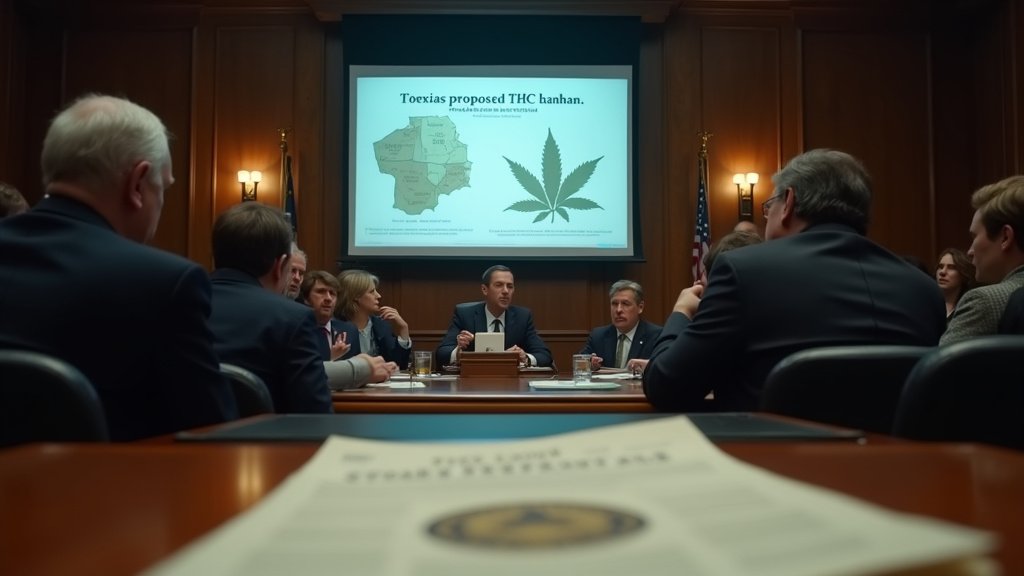Texas Senate Committee Doubles Down on THC Ban, Citing Regulatory Resource Constraints
In a move that has ignited renewed debate over cannabis-related products, a Texas Senate committee is actively pursuing a complete ban on products containing any detectable amount of Tetrahydrocannabinol (THC). This aggressive stance comes amid ongoing struggles within the state to define and regulate the burgeoning market for hemp-derived products.
The committee’s decision, which would be codified in Senate Bill 5 if passed, aims to criminalize the possession of any hemp-derived THC products. The rationale behind this push centers on the assertion that state and local governments lack the financial and personnel resources necessary to effectively regulate these substances. This argument, which hinges on the complexities of testing, enforcement, and product oversight, suggests a fundamental disagreement on the feasibility of regulating the THC market at all.
A Familiar Battleground
This latest development represents a continuation of a long-running battle over cannabis-related legislation in Texas. It is particularly noteworthy considering Governor Greg Abbott’s prior intervention. In the previous legislative cycle, the governor vetoed Senate Bill 3, a bill that sought to regulate THC products. Instead of pursuing a ban, SB3 aimed to establish a regulatory framework for these products, creating guidelines for product testing, labeling, and sales. Abbott’s veto of that bill, and the current committee’s action, demonstrates the complex and often contradictory approaches to this issue within the state’s political landscape.
The differing viewpoints reflect a broader societal struggle to reconcile shifting public opinions about cannabis with existing legal frameworks. While some advocate for regulation, seeing it as a way to protect consumers and generate tax revenue, others, like the Texas Senate committee, remain steadfast in their opposition, prioritizing a complete prohibition. The crux of the debate rests on the definition of what constitutes an acceptable substance within the state, and how best to balance public safety with individual liberty.
The Implications of a Ban
The ramifications of a complete ban on THC products would be significant. It would likely affect a wide range of businesses and consumers. Businesses that currently operate in this space, including manufacturers, distributors, and retailers, would be forced to adapt, likely facing potential shutdowns or costly legal challenges. Consumers who use THC products for recreational or medicinal purposes would find themselves without access, unless they sought out products in the black market.
Furthermore, the ban could create a strain on law enforcement agencies, who would be tasked with enforcing the prohibition. As the committee cites a lack of resources, the new legislation would likely increase the workload. This could lead to challenges in effective enforcement and could potentially impact the allocation of resources away from other pressing matters.
Reporting from The Texas Tribune
The developments surrounding Senate Bill 5 are being closely followed and reported by The Texas Tribune, a leading source of in-depth reporting on Texas politics and policy. The Tribune’s coverage has provided crucial insight into the details of the bill, the arguments of its proponents, and the potential impacts on various stakeholders. The independent journalism of The Texas Tribune has been instrumental in keeping the public informed about the evolving debate around cannabis regulation in the state.
Looking Ahead
The Texas Senate committee’s latest move signals that the debate surrounding THC products is far from over. The legislative process is now set to determine the ultimate fate of Senate Bill 5, with potential amendments and negotiations ahead. The public’s and interest groups’ reaction will surely play a crucial role. As the bill moves forward, stakeholders will be closely watching the discussion and the possible impact on legislation related to the cannabis industry.
The focus will undoubtedly shift towards weighing the advantages of a ban, such as perceived public safety improvements, against the potential economic and social consequences of criminalizing products that are legal in several other states. This is a complex issue with no easy answers. The discussion surrounding Senate Bill 5 will therefore be closely scrutinized as Texas navigates the evolving landscape of cannabis regulations.






